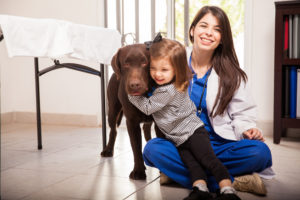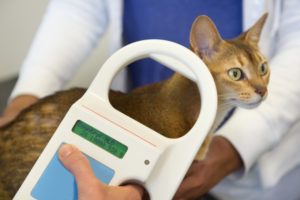Losing a pet is a pet owner’s worst nightmare. Sometimes, pets are never recovered, but microchipping your pet increases the odds of being reunited with your lost pet. According to PetFinder.com “Only about 22 percent of lost dogs that entered the animal shelters were reunited with their families. However, the return-to-owner rate for microchipped dogs was over 52 percent (a 238 percent increase). Less than 2 percent of lost cats that entered the animal shelters were reunited with their families.”
What is microchipping?
A microchip is about the size of a grain of rice. This electronic chip is enclosed in a glass cylinder and when a scanner passes over the chip, the chip is activated and transmits an identification number unique to your pet. It is inserted under your pet’s skin, usually between the shoulder blades, through a hypodermic needle. There is no surgery required and it should not be any more painful than a normal injection.
What Information Does the Microchip Contain?
Your pet’s microchip will contain an identification number and is registered with a microchip registry where your contact information is stored. If your pet should become lost a veterinarian, shelter or rescue group can scan your pet and contact the microchip registry to notify them that they have your pet. The microchip registry will then contact you. Your contact information is not shared with the rescuer.
Do Microchips Have GPS?
No, microchips are not the same as GPS and do not have the capability to track your pet.
Do I Still Need Identification Tags if My Pet is Microchipped?
Yes! Identification tags are the quickest way for you to be reunited with your pet. While a microchip is a permanent identification that cannot be tampered with, having an identification tag attached to your pet’s collar makes it easy for the person who finds your pet to contact you immediately. However, if your pet’s collar is removed or lost, a microchip may be the only way you will be reunited with your pet.
Are Only Dogs and Cats Microchipped?
No, all kinds of pets are microchipped including rabbits, horses, cows, ferrets, reptiles and many more.
At What Age Can my Pet Be Microchipped?
Most Shelters and veterinarians will microchip your dog or cat once they are 8 weeks old. It is actually the size of your pet that determines when they can be microchipped.
What Are the Risks of Microchipping?
Complications from microchipping your pet are very rare. There have been cases of a pet developing a cancerous tumor at the microchip site, but those cases are very rare. The benefits of getting your lost pet back far outweigh the risks.
How Do I Get My Pet Microchipped?
Your veterinarian or local animal shelter can microchip your pet for you. If you adopt a pet from your shelter or local pet rescue it will most likely already be microchipped.
How Much Does Microchipping Cost?
The average cost is about $45 however, your local shelter or Humane Society will usually offer microchipping at a discounted price. The price is a one-time fee. If you are adopted your pet from a local shelter or rescue, it is likely that your pet is already microchipped.
Do I have to Register My Pet’s Microchip?
Yes. When your pet is microchipped the shelter or veterinarian will provide you with the information you need to have your pet’s microchip registered. If you move or change phone numbers, you will need to update your contact information.
May is National Chip Your Pet month. This is a great time to get your pet microchipped if you have not already done so. This is also a great time to have your pet’s microchip checked by taking them to your local veterinarian to have them scanned.
Is your pet microchipped? Tell us what type of pet you have and why or why not you have chosen to have your pet microchipped.



